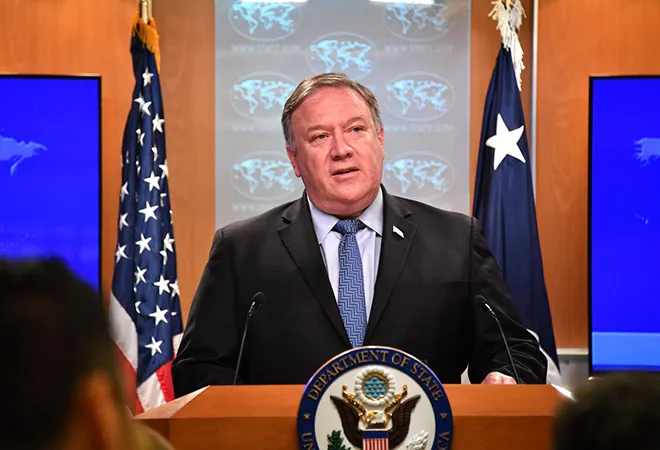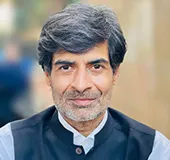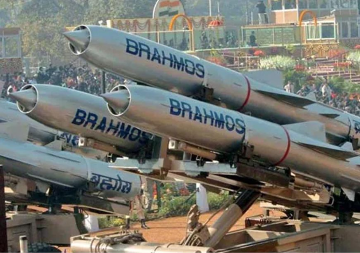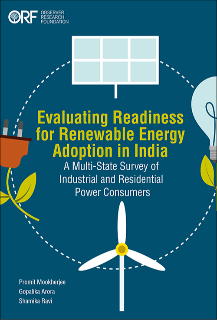
US Secretary of State Mike Pompeo is visiting New Delhi with a mission: to correct perceived economic and strategic inequities in bilateral relations between the world's oldest and largest democracies.
Three issues, in particular, stand out: India’s recent data localisation measures; the purchase of Russia’s S-400 missile defence system; and, oil trade with Iran. The Trump Administration's usual negotiating idiosyncrasies—unilateral economic measures and sanctions to use later as bargaining chips—have already preceded the visit.
Underlying these tactics, however, is a widely held consensus in Washington DC to support efforts that restore 'American leadership' over global affairs. While the American strategic community may argue over the Trump Administration's ham-handed methods, the end goal is the same. The thinking is born amidst the lengthening shadow of China’s rise, digital transformation of industrialisation and the global economy, and America's increasing self-doubt over the continued dominance of its global position and the resilience of the world order it has shaped between the fall of the Berlin Wall and the rise of the Great Wall of China.
India, it appears, is caught in the headwinds of America's geopolitical and geoeconomic reorientation. Unfortunately, the US is unwittingly undermining its relationship with India while trying to win the zero-sum race for ideological, economical, technological and military superiority.
At a sectoral level, the US is basing its strategy on two faulty premises. The first is economic. The US believes that Silicon Valley possesses the capacity and is vested with the legitimacy to underwrite India’s digital industrialisation.
This line of thinking ignores years of history in industrial development and American geoeconomic partnerships. A strong domestic industry and globally competitive corporations enabled American allies in Europe and East Asia to industrialise. The US, for its part, was a financier and a consumer market. With its recent policies on data governance and security, New Delhi is ensuring that Indian industry and governance propositions will dictate its development and growth during the Fourth Industrial Revolution.
Like with the electronic, automobile and aeronautical industries in Europe or Japan, India will design bias into its industrial policy to incubate its own domestic giants for the digital age. It will also protect its ability to provide security and guarantee the rights of its citizens in cyberspace—an area where American tech companies have certainly been found wanting. Rather than fight the inevitable, the US should partner with India to create an equitable, competitive and secure global regime for cyberspace—especially at a time when the risks of fragmentation are real.
The second faulty premise is strategic. The US is overestimating its long-term ability to dictate India’s relationship with its partners—especially Iran and Russia.
The US is being typically sanctimonious while seeking to dictate to India the terms of engagement with others. When Washington has maintained promiscuous defence relationships with several partners in West Asia and the extended Middle East, including with Pakistan, why expect India to act differently? India will maintain multiple defence and strategic partnerships based on its national security requirements.
More important, the US is ignoring the reorientation of geographies. The 21st century will be defined, in part, by the merger of Asia and Europe into the Eurasian supercontinent. India will be a crucial node in this arrangement, as it will in the Indo-Pacific maritime system.
In Eurasia, New Delhi must partner with Moscow and states like Iran to create order and opportunity for itself. This is India’s long-term prerogative and cannot be held hostage to America’s short-term impulses. It is arguably in the US’ interest to follow India’s lead in the governance of this region, given its integration with Eurasian actors and institutions.
In Eurasia, New Delhi must partner with Moscow and states like Iran to create order and opportunity for itself. This is India’s long-term prerogative and cannot be held hostage to America’s short-term impulses. It is arguably in the US’ interest to follow India’s lead in the governance of this region, given its integration with Eurasian actors and institutions.
The friction in both the economic and defence sectors is a product of faulty ‘big picture’ thinking about the India-US bilateral relationship. In the post-War period, America’s partners have all been dwarfed by its economic might and military capability. The Americans are keenly aware of this. For their own prosperity and security, they crave for a liberal order under American leadership. My friend Michael Fullilove of the Lowy Institute once paraphrased Winston Churchill to justify that “the US-led world order is the worst form of world order, except all those other forms that have been tried.”
This is not necessarily true for India.
A country of India’s size cannot emerge as a ‘leading power’ in a world order tailored to protect and promote the interests of one country. Think about the prospect in absolute quantitative terms. Should India try and ‘fit’ itself into the worldview of a country that has three times it's land and one-third its population?
What’s more, India’s economy may well surpass that of the US’ in size by the middle of this century. Look at it another way: America will, for the first time in over a century, be the smaller economic actor in a partnership. And unlike with Japan, Korea, Australia or the EU, the US will not be a guarantor of Indian security. Why, then, does Washington assume that its existing partnership templates will work with India?
Of course, there is a lesson in all of this for New Delhi. For too long, Indian policymakers have allowed ‘strategic ambiguity’ to guide foreign policy choices. In a rapidly fluctuating world order, this is bound to end in disaster. India must make clear what role it seeks in the international order and decide upon the means to achieve them.
The government of the day, arriving as it has on the back of a phenomenal election victory, must shape the imagination of Indians as to their place in the world. There are certainly many aspects of the world order that India will support, notably, liberal norms and rules-based trade and security. Nevertheless, it will not be hostage to a ‘US-led’ order. India will continue to push for a greater distribution and devolution of decision-making powers.
Rather than undermine India’s long-term ambitions, it is in America’s interest to recognise India as a co-sponsor and co-guarantor of the liberal order it incubated. This will necessarily involve trade-offs and compromises by both states. But that is expected of a relationship that carries the potential to define the course of the 21st century.
The views expressed above belong to the author(s). ORF research and analyses now available on Telegram! Click here to access our curated content — blogs, longforms and interviews.




 PREV
PREV


